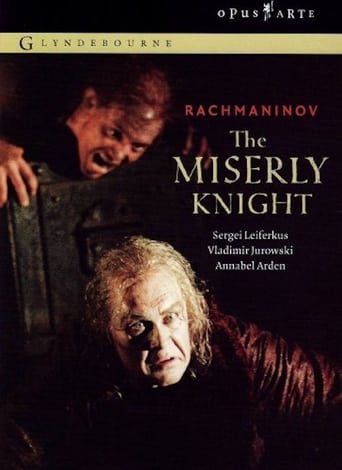TheLittleSongbird
Two fine operas done justice in two outstanding productions, both from Glyndebourne. As an opera I prefer Gianni Schicchi, mainly because I am more familiar with it and there are more memorable tunes. But The Miserly Knight has wonderful, almost haunting music and a brooding story. So both operas in a nutshell are well worth checking out.Starting with Gianni Schicchi by Puccini, the production is just wonderful, of the individual Gianni Schicchi performances(those that are not performed as part of Il Trittico) it is this one from Glyndebourne. The sets and costumes are traditional and look beautiful and the choreographed action is uproariously funny. The musical values are equally brilliant, with sprightly yet sensitive orchestral playing and commanding and relaxed leadership from Vladmir Jurowski. Alessandro Corbelli is a sly and hilarious yet subtle Schicchi, his voice is lovely and characterful and as ever his comic timing is impeccable. Sally Matthew is charming and humorous as Lauretta, her O Mio Babbino Caro is spine-tinglingly beautiful, and Massimo Giordano sings Rinuccio with the right force and ring. There is not a better Zita than Felicity Palmer, likewise with the La Ciesca of Marie McLaughlin, and while Luigi Roni's voice has been in better shape, with a somewhat dry vocal production, before he is fine as Simone and blends well in ensembles.Which brings me to The Miserly Knight by Rachmaninov. The opera is incredibly difficult to stage, and I think Anabel Arden(also director of Gianni Schicchi) does a superb job with it. There is an additional character in the production played by Matilda Leyser, but instead of detracting from the opera like other additional characters have done this additional character adds to the brooding atmosphere with her haunting and shadowy movements. The production values are claustrophobic yet atmospheric, the cellar setting is particularly effective, While the musical aspects have no problems whatsoever, the orchestra bring so many textures to their playing while Jurowski leads an exciting reading of this psychologically astute- especially in the vocal lines- and densely-textured score. Sergei Leiferkus gives a towering performance, perhaps the best I've seen him. His 25 minute monologue is just phenomenal vocally and dramatically. Albert Schagidullin is a Duke that is both shrewd and noble, complete with a huge voice. Richard Berkeley-Steele is not quite on the same level but his Albert is still convincing.All in all, both productions are outstanding with musical values and cast that are note perfect, and in both the stage direction does wonderfully in bringing out the comedic nature of Gianni Schicchi and the haunting broodiness of The Miserly Knight. 10/10 Bethany Cox
Wim Vorster (wim-vorster)
Young, and very dashing, conductor Vladimir Jurowski concludes his interview in the DVD's bonus material with: "But it's not an opera." He is right. If one is a stickler for recipes, Rachmaninoff's The Miserly Knight will be a disappointment. Even a disaster. There is no chorus. There is no female singer only five male characters. There are no memorable tunes. And thank goodness no recitatives either. The viewer/listener has to wrestle a one hour body of masculine and muscular music. The only moments you are allowed any relief are in the brief breaks between scenes. The ArtHaus DVD, by the way, is of the highest quality with genuine surround sound and high definition visuals.Director Annabel Arden - who staged this relatively unknown work at the Glyndebourne Festival together with Puccini's Gianni Schicci in a programme called 'Avarice and Greed' - presents an equally brawny portrayal of miserliness causing misery. She even fills the orchestral interludes with strong visual material. An aerialist (depicting feminine wiles) and film images are used to flesh out the story.Sergei Leiferkus, as the baron hoarding his fortunes, is unbelievable. Being a baritone, he has to tackle this part which is too low for a baritone and too high for a bass with every fibre in his being. He has an uninterrupted solo of twenty five minutes and he sustains this in what appears to be an effortless way. Tour de force is such a cliché but what other expression suffices? Perhaps he is the only singer in the world who can take on the role at the moment. One is left breathless by his performance AND on his behalf.Richard Berkeley-Steele, with a shock of red hair, as Albert his hapless son is equally convincing and so are the sly servant, the glib money-lender and the smug but shrewd duke. And the aerialist lends exactly the right touches of surrealism and symbolism to the production. It is difficult to define the period in which it's set, but the work was composed in 1903-05 and premiered in 1906 so the money-lender's watch is conspicuously modern. The costumes and set(s) however are spot on.Don't expect the Rachmaninoff of the Second Piano Concerto. Or any of his other compositions. He did not treat the original Pushkin text as holier than holy (like most Russian composers did).To him music and lyrics were of equal importance. In fact sometimes the music outweighs the lyrics. Which makes the work quite unique and brings about a full emotional experience. Add to this the visual elements of the production, the quality of voice and acting plus Jurowksi and the orchestra's excellence and it is exceptional. Bravo! And bravo for staging the work. "But it is not an opera..."
